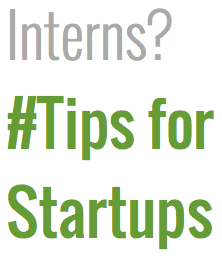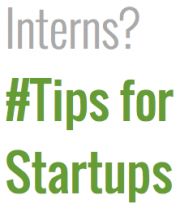 If you’re looking for a start-up intern, there are several key qualities that should be at the top of your list. Below are tips for interns that you can use as a guide to choosing the right intern for your start-up.
If you’re looking for a start-up intern, there are several key qualities that should be at the top of your list. Below are tips for interns that you can use as a guide to choosing the right intern for your start-up.
It isn’t Just an Internship
Before we dive into what to look for in a start-up intern, I want to emphasize one vital precursor to making the most of your intern (or internship) that will, ideally, result in a full time relationship: See the internship as an interview.
It isn’t just an internship, and it’s not a long-term position. It does not have a salary (however, it could be a paid internship) and, although it can help your start-up get it’s ‘sea legs’, it’s still just an internship.
That said, interns you need to put your best foot forward and hit the ground running because, I’m assuming, an internship isn’t your ‘end-all, be-all’ life aspiration. Treat your internship as an extension of your interview. It’s the hands-on portion of the test. It’s your chance to show what an all-star you are, while gaining valuable career experience.
With that in mind, here are qualities to look for in a start-up intern and rockstar tips for interns:
5 Qualities to Look for in a Start-up Intern
- The ability to think like a creative problem solver. You’ve landed your internship and now your mission is to add as much value as possible to your start-up employer. It’s time to make them wish they had hired you sooner! How do you do this? By being a creative problem solver. This means if you’re given a task and it doesn’t come together on the first try, try again. Then, try again. Come at it from a different angle. The task could be anything from a printer that refuses to work, tracking down editorial calendars, or navigating a new online software. Experiment and don’t give up after your first few tries. Commit to finding the solution.
- Strong work ethic. Expect to work until the project is done. A start-up internship isn’t a 9-5 deal. Sorry to burst any preconceived bubbles here, but let’s be real. As a start-up intern, your job is to help take some of the workload off of the rest of your team. You cannot be the best help to your team if you’re leaving projects unfinished or missing deadlines because five o’clock came along and you had plans with friends. Remember, this isn’t just an internship, it’s an interview, and you want to ace it. Demonstrate you’re a team player who understands projects are promises – and you keep your promises.
- The ability to communicate. Communicate. Communicate! I cannot tell you how many interns and entry-level team members I see fail in this category. Time and again there’s a complete lack of status updates on projects and goals. Worse still, as mentioned above, are loads of broken promises in the form of missed deadlines and half-completed projects. You absolutely cannot leave your assignment statuses up to the assumptions of others. Not communicating = not completed. If you’re stuck or you’ve made progress but haven’t completed a task, report back to the person who assigned it to you with an update. This can be as simple as an email that communicates a project status. If you don’t communicate, the assumption might be you’re either not good at a given task, or worse, you’re irresponsible.
- A think before asking mentality. This. Is. HUGE. As I said, it’s perfectly OK to ask questions. However, there’s this super amazing, easy-to-use, free tool called Google and if you can use it to get the answer…don’t ask. Be quick to think and slow to ask. This is where creative problem-solving comes into play. You aren’t expected to figure everything out for yourself, but you are expected to think for yourself.
- A ‘strive to add value’ mindset. This is an extension of creative problem-solving, but it’s different. Treat your employer’s business as if it was your own. This mentality means promises made must be fulfilled, and deadlines must be met. If you can’t figure out a solution to the problem, and you can honestly say you’ve given it the best you could, think through a potential solution and then ask for help. I’m not trying to discourage asking questions. Questions are a part of the learning process and if you’re truly listening and have questions, ask them. Asking questions can demonstrate you’re thinking critically and trying to get to the best result through the most direct way possible, thereby adding value.
There are definitely more items that can be added to this list, but if you look for these five qualities, you’ll be well on your way securing a solid start-up intern.
What do YOU look for in a start-up intern?
A version of this post originally appeared on Spin Sucks.




